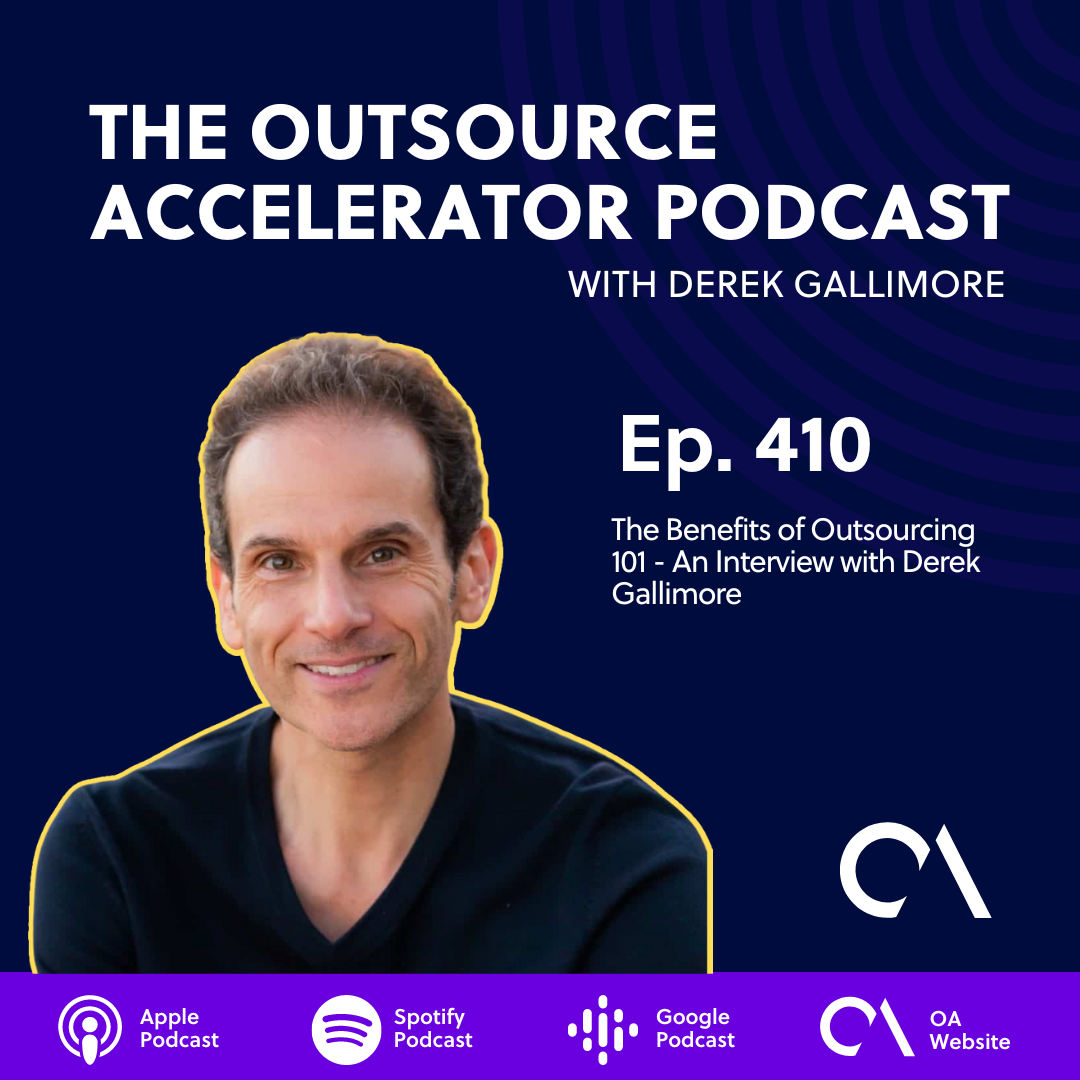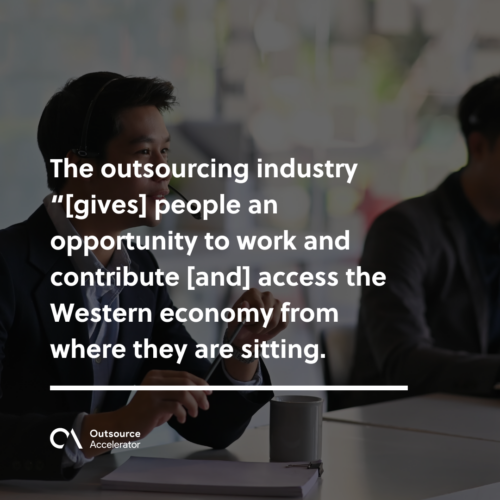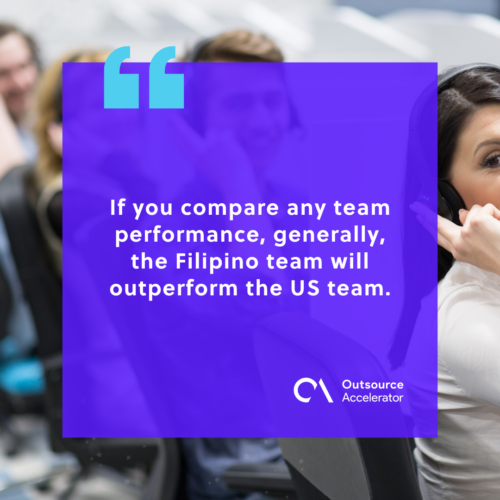The benefits of outsourcing – An interview with Derek Gallimore

Derek and Outsource Accelerator
Episode 410 of the Outsource Accelerator Podcast puts a bit of a twist on how the podcast’s episodes usually go.
In this episode, Derek is the one getting interviewed by Jeffrey Feldberg, owner, co-founder, and CEO of Deep Wealth, an advisory firm that assists businesses toward an exit or liquidity event.
Derek is the founder and CEO of Outsource Accelerator (OA), the world’s foremost authority in everything outsourcing. He is also the author of a book on the outsourcing industry, Inside Outsourcing.
Derek’s company functions “like a TripAdvisor representing the outsourcing world [and lists] about three-and-a-half-thousand outsourcing firms.”
OA connects businesses to the “USD 250 billion annually” outsourcing industry that “not only [gives them] staff at a massive discount, but can also help build [them] processes.”
Jeffrey and Derek’s conversation in this episode sheds light on some of the myths and misconceptions surrounding the outsourcing industry.
Jeffrey also asks Derek to “help remove the lens of the West” and help people “really look at [outsourcing] for what it is.”

Outsourcing 101: Dispelling the myths
The outsourcing industry has long been at the receiving end of baseless criticisms and unfair allegations.
From being just shy of being sweatshop operations and stealing job opportunities from other countries to providing subpar quality services, the industry’s detractors have no shortage of castigations to hurl.
Myth #1: The outsourcing industry exploits workers
The first misconception that Derek tackled is that “people are being taken advantage of” by the industry.
Derek is well aware of this view and understands that “for those that don’t travel too much and aren’t exposed to the rest of the world so much … it’s hard to really grasp … they live in very different realities in the developing countries.”
“Often as much as half of the population are earning under a dollar per day [and] large swathes of the world are earning less than USD 1.90 a day.”
The outsourcing industry “[gives] people an opportunity to work and contribute [and] access the Western economy from where they are sitting.”
It essentially gives them “access to an economy where they can earn USD 10 to USD 20 to USD 50 a day.”
Myth #2: Outsourcing displaces local workers
As Jeffrey points out, many people are worried that turning to offshore staffing firms will take away jobs from local workers and increase the unemployment rate.
However, the outsourcing industry is still a way of supporting the local economy through the enrichment of local businesses.
For example, one of Derek’s company’s former clients is a US company from a relatively small and isolated town that relies on tourism.
The company was having staffing problems and “lamented that [they were] hiring from a talent puddle and not a talent pool.”
Outsourcing helped this company get back on its feet and “hire the right people for the job very quickly” by having “access to a country of 110 million highly-qualified people.”
In short, outsourcing doesn’t take away jobs from local workers.
Instead, it gives local employers access to skilled global workers that can perform the jobs that local workers aren’t keen on taking or qualified to take.
Myth #3: Outsourced work is not quality work
Another misconception about the outsourcing industry is that it gives poor quality results and that outsourced workers aren’t up to international standards.
However, this is far from the truth.
The proof of outsourcing’s quality services can be found in the Philippines’ BPO scene.
The country “is home to Facebook, [Google, Coca-Cola, Procter and Gamble, JP Morgan, and Citiroup]. It is home to every major Fortune 500 [in the region].”
These well-known brands entrust their operations to the capable hands of offshore professionals – and these are the same workers that outsourcing companies employ.
Language isn’t a barrier either, especially in the Philippines where English is also an official language.
In fact, “all of the street signs in the Philippines are in English … all of the law, all of the medicine, everything is written in English.”
BPO investors are also likely to “find Filipino Harvard [and] Stanford graduates … in the Philippines [and] they are world-class, high-caliber professionals.”
Derek assures “If you compare any team performance, generally, the Filipino team will outperform the US team.”
Outsourcing: A win for all involved
Outsourcing to the Philippines (or any other country for that matter) is a win for every party involved – the BPOs, the outsourced workers, and the companies that outsource.
For outsourcers, the industry gives access to “about a 60% to 80% discount” for labor costs.
Simultaneously, it gives “young professionals … even seasoned executives, the opportunity to work for a Western company [and earn more].”
Outsourcing gives businesses access to “not just cost saving, [but also] access to capable staff.”

Creating global opportunities through outsourcing
The COVID-19 pandemic has greatly impacted the global economy and shifted the corporate norm from on-site to remote work.
“It forced many business people to very quickly flip into some sort of remote alternative way of working.”
Consequently, it also gave them the “opportunity to tap into the global workforce [and] access abundant talent when it is in such a shortage.”
The outsourcing industry is basically “the gateway to global employment” that businesses can turn to “when [they’re] struggling to find someone, there’s a skills shortage, staffing shortage, [or] great resignation.”
Derek can be reached via email at [email protected], or through OA’s website, outsourceaccelerator.com.







 Independent
Independent




